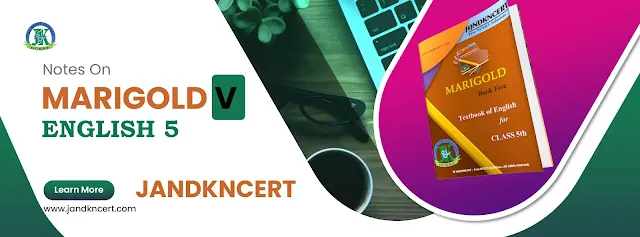JANDKNCERT - Free NCERT Solutions
English | Marigold Book V
If you are seeking NCERT solutions, you've
come to the right place. JANDKNCERT offers free solutions for a variety of NCERT
books, including the recently introduced 'Marigold' English version for Class 5
students in JK UT. Explore our library at www.jandkncert.com for valuable study materials and simplified
solutions to the lessons/chapters in this book. To view the Tulip Series of
class 5th English visit https://www.jandkncert.com/p/free-ncert-solutions-for-class-5th.html
In this post, you will find the summary, questions and
answers to the poem ‘My Shadow’, taken from the recently
introduced English for JK UT students, Marigold Book V. Read the poem from the
Textbook of English Marigold Book V of JK or download the same series from the
ncert website.
Unit 3
Summary | Questions | Answers |
Poem 3. My Shadow (Robbert Louis Stevenson)
My Shadow
I have a little
shadow that goes
in and out with
me.
And what can be
the use of him is
more than I can
see.
He is very, very
like me from the
heels up to the
head;
And I see him
jump before me,
When I jump into my bed.
The funniest
thing about him is the way
he likes to grow
Not at all like
proper children, which is
always very
slow;
For he sometimes
shoots up taller like an
India-rubber
ball,
And he sometimes
gets so little that
There's none of
him at all.
One morning,
very early, before the
sun
I was up,
I rose and found
the shining dew
on every
buttercup;
But my lazy
little shadow, like an
arrant
sleepyhead.
Had stayed at
home behind me and was
Fast asleep in
bed.
(Robert Louis Stevenson)
New Words
India-rubber
ball: a ball that can bounce very high
buttercup:
a yellow flower
arrant:
bad
arrant
sleepyhead: completely inattentive
Short Summary
"My
Shadow" by Robert Louis Stevenson is a
delightful poem that explores the playful and inseparable relationship between
a child and their shadow. The poem describes how the speaker's shadow is a
constant companion, mimicking their every move, whether big or small. The child
is fascinated by the versatility of the shadow, which can be short or tall
depending on the time of day or the position of the sun.
Stevenson captures the innocence and curiosity of childhood as the speaker imagines the shadow as a separate entity with its thoughts and actions. Despite its silent and unobtrusive nature, the shadow is portrayed as a loyal and entertaining friend, making the mundane activities of life more enjoyable. The poem celebrates the magic and wonder of the simple act of observing one's shadow and the imaginative world it can create for a child.
Let’s Read
Question
1. Who do you think your shadow looks like?
Answer:
My
shadow looks like me.
Question
2. Why do you think your shadow jumps into bed before you can?
Answer:
My
shadow jumps into bed before I jump because it stands in front of me.
Question
3. What time of the day do you think it is when your shadow is the tallest?
Why?
Ø Morning
Ø Afternoon
Ø Night
Answer:
My
shadow is tallest in the morning because in the morning the sun is far away
from me.
Question 4. Read
the lines from the poem and answer the following.
He
is very, very like me.
From
the heels up to the head!
(i)
Who does ‘he’ refer to?
Answer:
‘He’ refers to the shadow.
(ii)
Who does me refer to?
Answer:
‘Me’ refers to the poet or narrator.
(iii)
Why are he and me alike?
Answer:
He and me are alike because ‘he’ is the shadow of ‘me’.
Let’s Write
1.
Fill in the blanks using one of the words given in brackets.
(i)
Where is the child ________ parents have come to school? (who/whose/which)
(ii)
I saw many houses ________ were quite spacious. (which/whose/who).
(iii)
Mathematics, ________ is my favourite subject, is so interesting.
(who/which/that)
(iv)
The poem ________ you read out, is so lovely. (whose/which/that)
(v)
I know the street ________ he lives on. (whose/ that/which)
(vi)
I like reading books ________ have pictures in it. (that/who/which)
(vii)
The old lady _______________ I met in your house is my neighbour. (whom /
that/which)
Answer:
(i)
Where is the child whose parents have come to school?
(who/whose/which)
(ii)
I saw many houses which were quite spacious. (which/whose/who).
(iii)
Mathematics, that is my favourite subject, is so interesting.
(who/which/that)
(iv)
The poem that you read out, is so lovely. (whose/which/that)
(v)
I know the street which he lives on. (whose/ that/which)
(vi)
I like reading books that have pictures in it. (that/who/which)
(vii)
The old lady whom I met in your house is my neighbour. (whom /
that/which)





Leave your comment here. Spam comments will be removed.